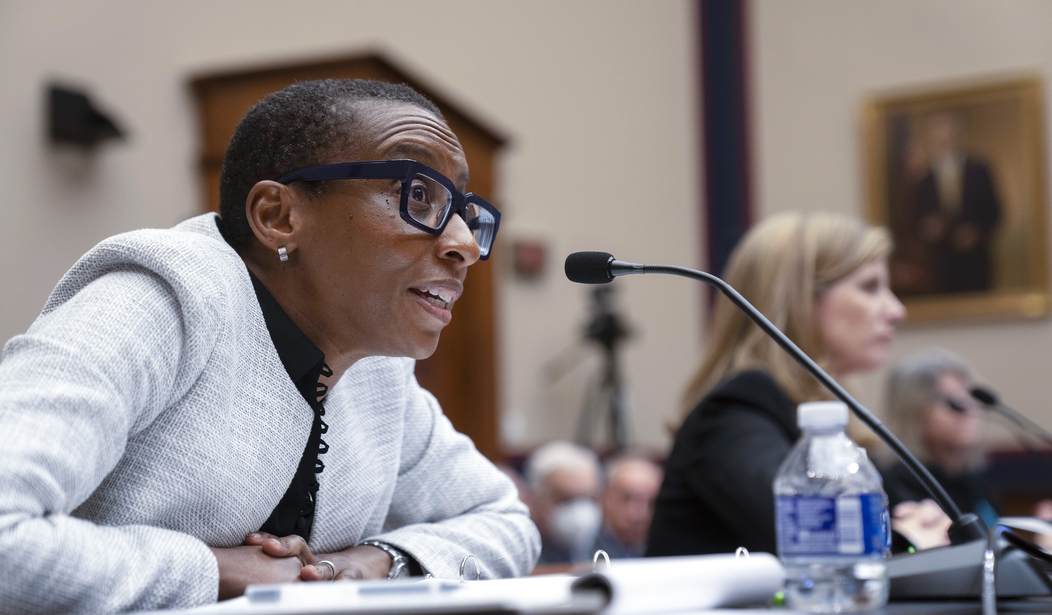Claudine Gay and Harvard’s board wants everyone to know that they are committed to free speech. Their allies have circled the wagons around Gay’s claim that calls for violence against Jews and intimidation tactics fell under the penumbra of the First Amendment, while Gay and Harvard shut down an event shortly afterward that featured a conservative who had criticized Gay.
Gay’s Harvard believed in free speech so much, in fact, that they responded to a New York Post inquiry about Gay’s alleged plagiarism by siccing their “defamation counsel” on the newspaper. The NYP revealed this episode last night, in which the newspaper had evidence in October of potential plagiarism. They contacted Harvard for comment before publication, citing more than two dozen demonstrable irregularities in Gay’s ‘scholarship,’ and asked the university to respond:
The Post contacted the university on October 24, asking for comment on more than two dozen instances in which Gay’s words appeared to closely parallel words, phrases or sentences in published works by other academics. …
When The Post brought the allegations to Harvard, Jonathan Swain, its senior executive director of media relations and communications, asked for more time to review Gay’s work.
A day later Swain, who was part of the Biden-Harris transition team and a one-time Hillary Clinton aide, said he would “get back in touch over the next couple of days.”
But he did not.
That’s when the lawyer got involved, and made clear his portfolio when it came to Harvard and Gay. And it wasn’t “media relations,” either, at least not in any normal sense:
And two days later, on Oct. 27, The Post was sent a 15-page letter by Thomas Clare, a high-powered Virginia-based attorney with the firm Clare-Locke who identified himself as defamation counsel for Harvard University and Gay.
The letter contained comments from academics whose work Gay was alleged to have improperly cited — even though the political scientists’ review could only just have begun.
Yes, nothing says We respect and uphold the First Amendment like sending a “defamation counsel” after a newspaper reporting on their officials. At least from the Post’s characterization of Clare’s response, nothing in it required a lawyer to explain to the Post. The purpose of siccing a “defamation counsel” in this circumstance is to send the message: Shut up, we’re explaining.
And even while Harvard chose to implicitly frame these allegations as some sort of ‘defamation,’ the board found at least some of these allegations to be significant enough to open an investigation themselves. As they announced on Monday, several weeks after Clare’s letter to the NYP, Harvard’s board required Gay to make changes to “two articles” due to “inadequate citation.” They knew all along that this wasn’t “defamation” at all.
So why didn’t Harvard simply get back to the NYP directly with a message that they would investigate these reported irregularities? If they’re all about free speech and the First Amendment, why did the Harvard Corporation bring in a ‘defamation’ lawyer rather than deal with the press inquiry through its public-relations team?
The answer is: Harvard has zero commitment to free speech, let alone the First Amendment. Harvard has a commitment to using its power to shut down criticism, debate, and viewpoints that differ from its woke ideological agenda. And it’s no coincidence that the only viewpoints that get the “free speech” fig leaf are anti-Semitism and defenses of Claudine Gay.
David Harsanyi concurs, and notes that actual free speech in Academia usually results in the penalties once reserved for plagiarism:
Now, we can’t bore into the souls of those suddenly and passionately interested in defending the values of free expression. But we do know most of them are nowhere to be found when the state is setting up Ministries of Truth or conservative speakers are being chased from campuses — or, rather, never invited to speak, much less teach.
Indeed, free speech is treated very much like plagiarism at places like Harvard. There are different sets of rules for different people. When a Cornell professor tells a crowd that the wanton murder of Jewish babies is an “exhilarating and energizing” event, he has an incontrovertible right to free speech without consequence. When the conservative Parkland survivor’s invitation to attend Harvard gets rescinded over slurs sent in private texts written when he was 16, not so much. This is a microcosm of the modern-day college experience. …
Still, the answer to this kind of bigotry isn’t to give Jewish students special DEI coverage to protect them from ugly speech. Rather, and there is no panacea, universities should be ridding themselves of all DEI protections so everyone has the same opportunities to speak. Not only Jewish students but students who hold other heterodox views — say, a belief in God or a belief that skin color doesn’t define a person or a belief that the American founding was a windfall for humankind. They just need the same freedoms the pro-terrorist crowd already enjoys.
When universities defend plagiarism by its leadership — or attempt to excuse it — while shutting down its critics and silencing journalists, that can be called many things. “Free speech” is not among them.









Join the conversation as a VIP Member